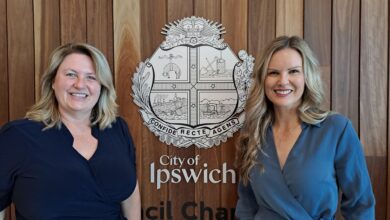Aluminium and steel are the royalty of recycling.
They keep on keeping on – use, dispose, recycle and re-use again.
In fact, almost 75 per cent of the aluminium ever produced is still in use today, while steel has a recycling rate of 86 per cent.
Aluminium drink cans and steel food tins are some of the staple items in terms of recycling in Ipswich and can be put in yellow top bins as part of the fortnightly kerbside collection service.
Works, Parks and Sport Committee Acting Chairperson Cr David Morrison said aluminium cans and steel tins are excellent materials for recycling in that they retain their properties over numerous (almost indefinite) recycling cycles.
“Aluminium cans are typically used to package soft drinks and other beverages while steel cans are typically used for food products,” he said.
“Aluminium is 100 per cent recyclable and experiences no loss of properties or quality during the recycling process. Recycling aluminium also uses only 5 per cent of the energy used to create new aluminium and emits only 5 per cent of the greenhouse gases.
“Steel cans, while lined with tin, are an easily recycled item. The tin lining prevents rust and food contamination but does not affect the recyclability of the product. Packaging in steel tins has been done for centuries and is one of the oldest forms of food packaging.
“When recycling tins, it is a good idea to rinse your tins out before placing them in the yellow top bin to prevent your bin from smelling. Placing your cans and tins in the yellow top recycling bin contributes to reducing the energy, effort and carbon emissions in obtaining virgin metal materials to make these products.”
Items acceptable for the yellow top bin:
Aerosol cans (empty, remove lid), baked beans & spaghetti tins, coffee & chocolate powder tins, deodorant cans (empty), hair spray cans (empty), aluminium trays (clean), pet food tins, soft drink cans, beer cans.
Items not acceptable for recycling:
Car parts, glass lids, tins and cans with food inside, scrap metals such as household appliances, metal cutlery, items made from any other metals (copper), chemical, oil, paint or other hazardous material containers, syringes.
Cr Morrison said council is concerned about an apparent increase in syringes being put in yellow top bins. Council staff had observed “loose uncapped sharps” in three of five loads segregated for recycling auditing purposes this week.
“Hypodermic needles are normally made from a stainless steel tube and are definitely not an acceptable item for recycling,” he said.
“There are several options: contact council for a sharps service (fees apply) or place sharps in a puncture proof container, such as a glass jar or sharps container with lid, and dispose in the general waste bin.”
Cr Morrison said crucial to council’s new Recycle 4 recycling campaign – targeting four specific types of materials to put in the yellow top bin – was cutting contamination rates by more than half.
“We have a new 12 month contract with Visy Recycling and are trying to make it easier for recycling so that we can all work towards getting under 15 per cent contamination for the city,” he said.
The list of four categories for the yellow top bin as part of the fortnightly kerbside collection service is:
- Paper: newspapers, magazines, junk mail, office paper
- Plastic: bottles and containers (milk, soft drink and shampoo bottles; yoghurt and ice-cream tubs)
- Cardboard: boxes, including clean pizza boxes
- Cans and tins: aluminium and steel (drink cans, food tins and aerosol cans).
Also check out the Ipswich Bin App and to learn more about council’s new recycling program head to www.ipswich.qld.gov.au/recycling or phone 3810 6666.


5